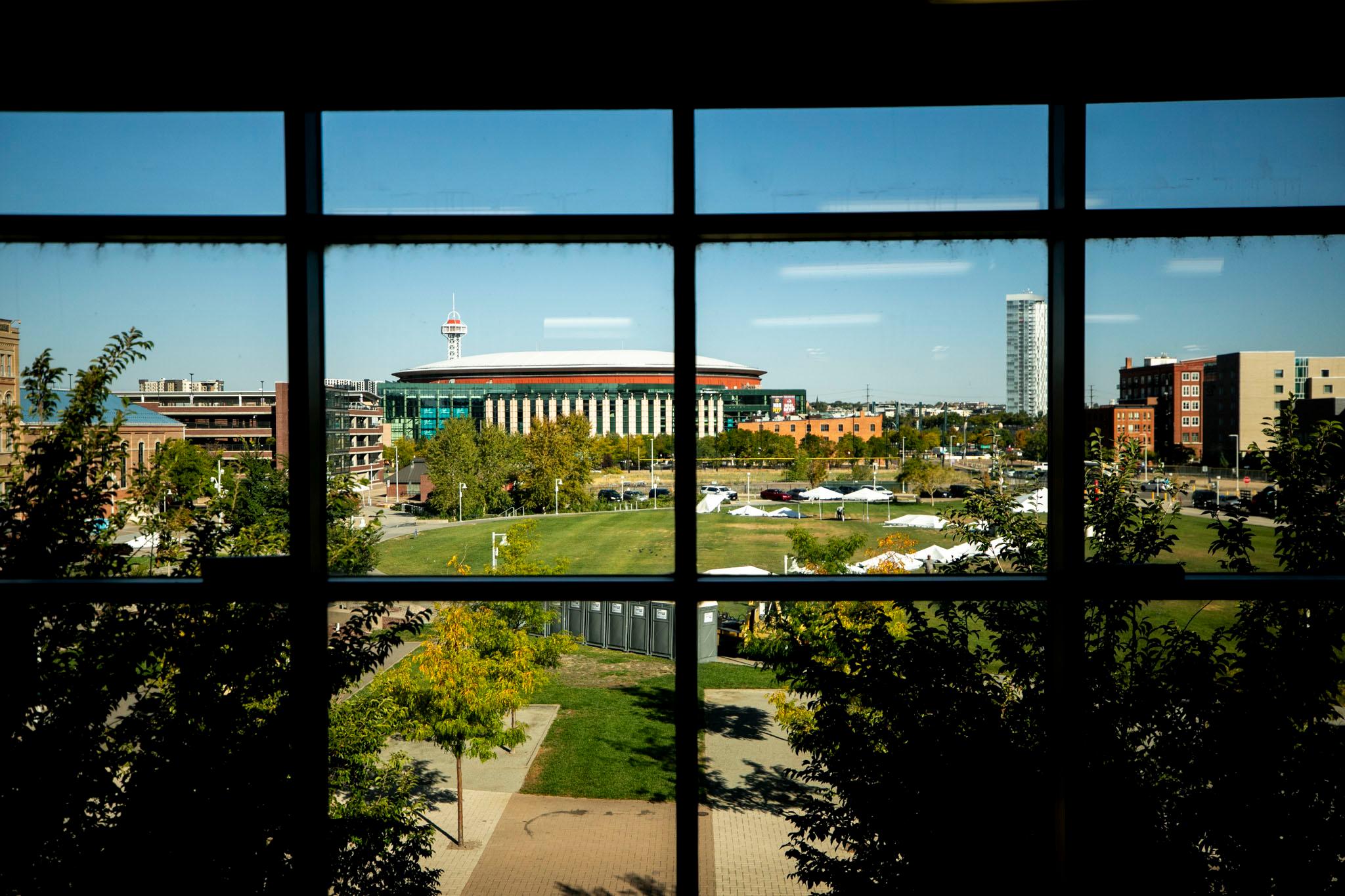After 15 months and thousands of hours of work, a coalition of groups from downtown and central Denver has struck a deal with Kroenke Sports and Entertainment over a massive development on 64 acres of parking lots around Ball Arena.
The signing of the new community benefits agreement could be crucial for billionaire Stan Kroenke’s ambitious plan to expand downtown Denver. The project goes before Denver City Council for approvals on Monday, and several council members have said they’ll only support the project if Kroenke gets the neighbors on board.
In exchange for signing the agreement, Kroenke will have the full-throated support of the Ball Arena Community Benefit Agreement Committee (BACBAC), the coalition of registered neighborhood groups and institutions in and near central Denver. It includes groups from the Auraria Campus, the La Alma/Lincoln Park neighborhood and beyond.
Susan Powers — a LoDo resident and a member of the BACBAC coalition — says the negotiations between the community groups and the developer were sometimes tense, but ultimately productive.
“They really stepped up,” said Powers, who is also the head of the redevelopment firm Urban Ventures. “They worked with the community from the very beginning.”
However, the project still faces concerns from some council members, especially because its towers could block some downtown residents' legally protected views of the mountains.

Here’s what the Community Benefits Agreement will do:
- The project could include a total of more than 6,000 housing units. The deal requires that Kroenke build 18 percent of those units as affordable housing for sale and for rent, and a portion of those must be two bedrooms or more.
- Of the businesses that lease on-site, 20 percent will be small businesses or women- or minority-owned. Residents of low-income parts of the city will have first dibs on construction jobs. And 20 percent of the permanent jobs on site will be prioritized for people in those communities, too.
- The site will include an early learning center for at least 150 kids. The agreement sets aside $1 million in internships for career pathways in sports and entertainment. A $1 million investment in internships in sports and entertainment will be marketed to Indigenous youth and descendants of residents displaced by the arrival of the Auraria Campus.
- At least $5 million will be spent on public art. Of that, 25 percent will go to Denver artists and another 25 percent will go to Colorado artists. Additionally, there will be 5,000 square feet of community art space.
- There will be funding for youth programming in collaboration with local nonprofits like Youth on Record. Kroenke will provide financing for tenant eviction assistance, downpayment assistance and other renter support services.
- Bike and pedestrian paths will connect the new development to the rest of the city, including a the planned 5280 Trail around downtown.
- Rothman’s Children’s Park, one of the few kid-friendly public spaces in downtown, will be preserved.
- The area will host regular free events for the broader community.
Additionally, there will be a $16 million community investment fund. The money for that will come from a 1 percent public improvement fee on retail sales and hotel bills in the new development.
The first phase of the project is expected to include a hotel, a 5,000-seat music venue that could rival Mission Ballroom, and new residential buildings. But future phases could be more complex, as the property is in a flood plain that will need to be addressed, Powers said.
The agreement between the developer and the community will be enforced by a yet-to-form nonprofit.
“I hope that this serves as a model for future efforts,” said Simon Tafoya, a La Alma/Lincoln Park resident on the BACBAC.
“It also shows that developers and community don’t always have to be at odds, that members of the community want to see investment, but it also means that we want to have a voice, and we also want to give voice to those who don’t always have a seat at the table.”

The plan for tall towers is still drawing concerns.
The project would require changes to the Old City Hall view plane, which limits the height of buildings in order to preserve views of the mountains. Some high-rise residents of Lower Downtown worry that will cut off their long-protected vistas.
View planes, as these residents see it, are preserved in city law for a reason and should not be modified. That's become a point of concern for several council members.
District 2 Councilmember Kevin Flynn told his fellow councilmembers that he was having “heartburn” over amending the view plane.
And he wasn’t alone.
“It is very concerning, the kind of precedent that we might set in getting rid of view-plane restrictions, simply for a large development that we all want to happen in a place that is right now nothing but parking lots and a terrible use of land,” said District 5 City Councilmember Amanda Sawyer, when the development came before city council for a first reading.
Council President and District 1 Councilmember Amanda Sandoval and District 10 Councilmember Chris Hinds also expressed concerns about the view plane when the issue came before city council earlier this week.
Nonetheless, all voted recently to move the issue forward to Monday’s meeting, when the public will have a chance to comment and the council will take its final vote.
The work of the BACBAC has included a slew of organizations: the Auraria/Central Platte Valley RNO, the Auraria Higher Education Campus, the Community College of Denver, the CU Denver Community Collaborative Research Center, the Denver American Indian Commission, the Denver Housing Authority, the Denver Streets Partnership, the Downtown Denver Partnership, Fresh Start, Inc., the La Alma/Lincoln Park Neighborhood, the Lower Downtown Neighborhood Association, Sun Valley Community Coalition and WORKNOW.











